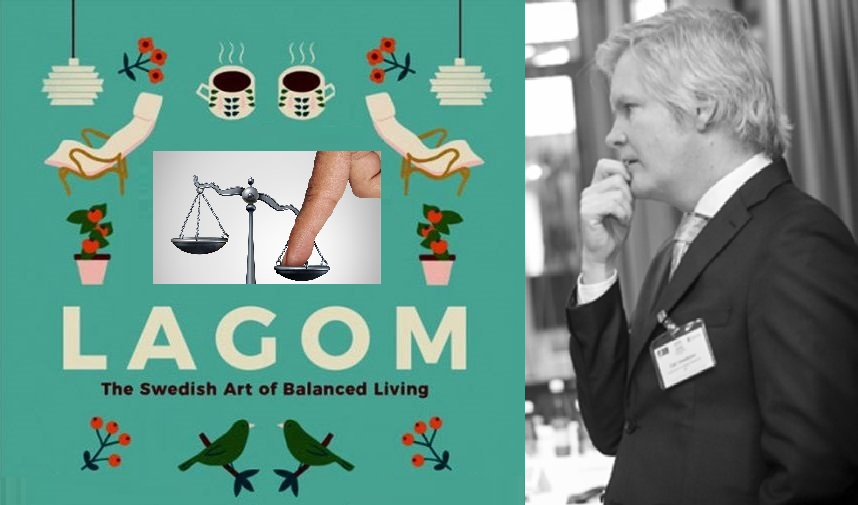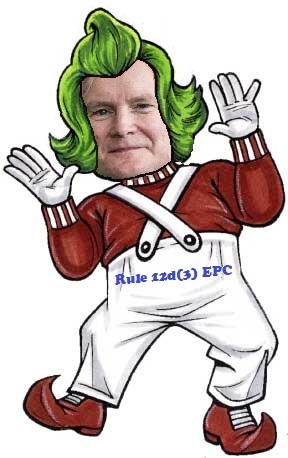

Something seems to be out of balance at the Boards of Appeal. Now what could that be?
One of the main protagonists in the legal shenanigans which have bedevilled case no. G 1/21 is the President of the Boards of Appeal, Carl "Calle" Josefsson, who appears to have become a casualty of his own hubris.
"His conduct was so outrageously out of order that it attracted a significant amount of public criticism."He insisted on taking charge of the proceedings and chairing the panel despite his obvious conflict of interest in the matter.
His conduct was so outrageously out of order that it attracted a significant amount of public criticism.
Partiality objections against Josefsson and other members of the originally appointed panel were raised in numerous "third party observations" [PDF] submitted to the Enlarged Board and in written submissions filed by the appellant on 27 April 2021. [PDF]
On 17 May, the Enlarged Board held an intermediate or "interlocutory" session to consider the objections which had been raised by the appellant.
The outcome of this interlocutory session was that Josefsson was deposed as chairman of the panel. One other member of the panel - Ingo Beckedorf – was also obliged to step down after he had admitted to the Enlarged Board that he had been personally involved in the drafting of the disputed provision concerning mandatory ViCo hearings.
At this point, one might be tempted to conclude that order had been restored and that there was nothing to worry about now.
"In reality, the removal of Josefsson from the proceedings has not solved the manifold problems which have dogged this procedure from the outset."After all, Josefsson had been replaced as chairman of the panel. Didn't this mean that he was safely sidelined from exerting any further influence over the proceedings? Where's the problem?
It's understandable that an uninformed observer might be tempted to draw such conclusions. However a closer study of the facts suggests that such optimism would be seriously misplaced.
In reality, the removal of Josefsson from the proceedings has not solved the manifold problems which have dogged this procedure from the outset.
By 17 May it was plain to all and sundry - including the other members of the Enlarged Board - that Josefsson's replacement had become necessary to avoid a complete meltdown of public confidence in the Boards of Appeal and the EPO in general.
However, on its own this corrective measure cannot be considered sufficient to remedy the further flaws in the procedure or to restore public confidence in the manner in which the Enlarged Board is dealing with the case.
To begin with, it seems that the Enlarged Board's interlocutory session of 17 May took place in the absence of the parties.
As noted by the pseudonymous poster "The fall of the EBA" in a comment on IPKat, the exclusion of the parties from this session seems to be a serious procedural violation:
Partiality might be discussed in a non-open OP before the EBA, but the first decision in which the chair of the BA [Josefsson] and his faithful servant [Beckedorf] were removed by their peers, was taken without the parties. This is a scandal on its own as even the discussion on partiality should be of contradictory [i.e. adversarial] nature.
The parties have the right to know why the members accused of partiality consider themselves this is not the case.

There seems to be a general consensus that partiality objections relating to Ritzka, Eliasson and van der Eijk have not been dealt with in a satisfactory manner.

Were the replacement members, Blumer and Bokor appointed in accordance with the applicable procedural rules?
"Had the Enlarged Board rescheduled the proceedings – as it should have done – that would not only have given the newly composed panel sufficient time to take proper stock of the case and have provided the appellant with an adequate opportunity to exercise its right to be heard."If the Enlarged Board had been acting in a truly independent manner free from subtle and hidden political pressures, it is clear that the only sensible course of action, following the interlocutory decision of 17 May and the sidelining of Josefsson, would have been to cancel the oral proceedings of 28 May and to re-appoint new oral proceedings at a later date.
Had the Enlarged Board rescheduled the proceedings – as it should have done – that would not only have given the newly composed panel sufficient time to take proper stock of the case and have provided the appellant with an adequate opportunity to exercise its right to be heard.
It would also have sent a clear signal that the newly composed panel wished to distance itself from Josefsson's scandalous conduct during the initial phase of the procedure and his cynically manipulative prioritisation of "speed" over "diligence".
It deserves to be pointed out that Josefsson had openly and brazenly acted in a manner which was in direct contradiction to a fundamental tenet of judicial conduct, "Nemo judex in causa sua".
This tenet is expressed in the following terms under item 9.2 of the Burgh House Principles:
"Judges shall not serve in a case with the subject-matter of which they have had any other form of association that may affect or may reasonably appear to affect their independence or impartiality".
We can conclude that the President of the BoA must have overlooked this principle when (originally) deciding to serve in case G 1/21.
Frankly, it is hard to see how even the appearance of impartiality can now be restored in view of the fact that the EBA has not (completely) rescinded the decisions taken by the President of the BoA in G 1/21.
The whole way G 1/21 has been managed by the chair of the EBA shows amply that the BA [Board of Appeal] are anything but independent.
On top of it, the chair of the BA [Josefsson] only has the powers delegated to him by the president of the EPO.
There is not even the perception of the independence!
epo.org link)

Chief Oompa Loompa Josefsson still rules the roost in Haar thanks to Rule 12d(3) EPC.
"The events surrounding G 1/21 have exposed the deficiencies in this "reform" in practice and make it clear that the "reform" has diminished rather than enhanced the independence of the Boards."In other words, although Josefsson can no longer influence the outcome of the procedure directly, he still has considerable means at his disposal to influence it indirectly.
In the next part of the series we will summarise the current state of the procedure following the hearing of 28 May and speculate about what might - or might not - happen when the procedure resumes in July. ⬆